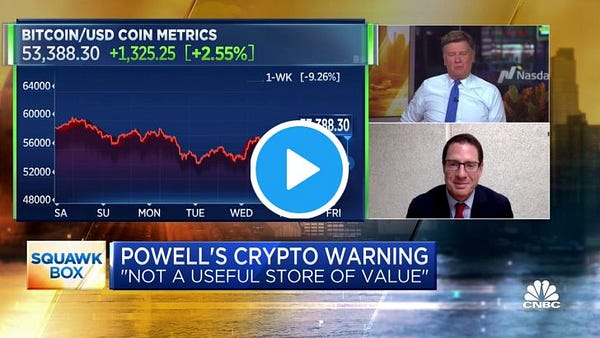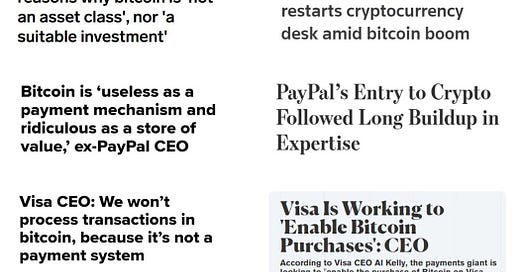“Fads don’t typically last 12 years.” -Wells Fargo, on Bitcoin
Banks and other financial institutions are changing their tune when it comes to Bitcoin because they have no choice. Bitcoin is monetary technology that makes them irrelevant, and as its price continues to rise, their best bet is to create financial instruments around Bitcoin (or other cryptocurrencies) so that they can take their fees. My suggestion: Don’t touch any of these Bitcoin-associated financial instruments with a ten-foot pole, if possible.
There’s a saying, coined by Isaiah Jackson, author of the book Bitcoin and Black America, that goes, “Not your keys, not your cheese” (coined on this episode of The Pomp Podcast. Also, check out Isaiah Jackson interviewed on CNBC here.) What Jackson means is that if you do not own the keys to your Bitcoin, you do not technically own the Bitcoin. Also, Caitlin Long, Founder and CEO of Avanti Bank (the world’s first digital asset bank), 22-year Wall Street veteran, and senior contributor to Forbes, warned early on against buying Bitcoin-related financial products as opposed to the Bitcoin itself. When you buy Bitcoin through a platform like Robinhood or PayPal, you do not technically own the Bitcoin. You own an IOU for the Bitcoin. The same holds true for Greyscale Bitcoin Trust ($GBTC) or any of the following ETFs that may launch in the near future:

Full disclosure: I own some $GBTC in my retirement account because I wasn’t willing to pay the fees associated with withdrawing funds from the account early. $GBTC is very transparent in regard to their Bitcoin holdings and they have been around for quite some time. However, I’d still much rather hold the underlying asset versus the IOU for one main reason. The business of lending your Bitcoin at high interest rates is just developing, and there is quite some return to be made. (I also despise big banks for a multitude of reasons, so maybe I have more than one main reason. Read Griftopia, by Matt Taibbi, if you, too, would like to despise big banks.)
If you lend your Bitcoin to an institution like BlockFi, you can make up to 6% APY on it. If you lend it to Gemini, you can make up to 3.05% APY on it. These rates are comparable to rates that banks used to offer for high-interest savings accounts. The great irony here is that banks now offer rates like a whopping 0.5% for their high-interest savings accounts for an asset that is currently depreciating - the U.S. dollar - while financial institutions like BlockFi and Gemini are offering significantly higher rates on an asset that is currently appreciating - Bitcoin. What’s most wild about BlockFi and Gemini is that the interest actually accrues in Bitcoin (or in whatever other cryptocurrency you lend to them). Please keep in mind that neither BlockFi nor Gemini are FDIC insured, though, BlockFi takes a number of measures to protect your money, and Gemini is insured by Lloyd’s of London. I assume at least one or two of the smart people that work at big banks know that lending Bitcoin is a burgeoning industry. And this is yet another reason why you don’t want to give them your money for a Bitcoin-associated financial instrument. When you give the banks your money for your Bitcoin IOU, they can then take that money, buy actual Bitcoin, and earn a yield from lending it. Don’t let them do this. Earn the yield for yourself.
So, if you do want exposure to Bitcoin, I recommend buying it through Coinbase, Gemini, SwanBitcoin, or even CashApp (though, I don’t recommend leaving crypto assets on mobile devices because of “SIM Swaps”). Using these channels, you hold your own keys and can lend your Bitcoin (or other crypto asset) to earn yield. Even if you don’t want to lend it to earn yield, you can still choose to safely self-custody your asset on a Trezor, a Ledger, or a ColdCard. Either way, you get to control your asset when you own the keys to it, as opposed to hoping that your IOU one day pays out.
Plus, when you use platforms like Coinbase, Gemini, SwanBitcoin, or CashApp, you are investing in entrepreneurs, people who have helped to usher in this new, more transparent era of finance, and not bankers, people who prey on their clients and who repeatedly collapse the financial system knowing that they will get bailed out by the Fed at the expense of the U.S. taxpayer and the U.S. dollar time and time again.

Check out what Brian Brooks, former acting Federal Comptroller of the Currency and former Chief Legal Officer at Coinbase (Yes, someone who headed a federal office also worked at Coinbase. I’ll take this revolving door over the Federal Government-Goldman Sachs revolving door any day of the week), had to say about Bitcoin below:


So, watch out now as the Bitcoin rhetoric heats up amongst bankers and corresponding institutions. Even the chair of the largest bank in the world, the U.S. Federal Reserve Bank, Mr. let’s-pump-up-this-inequality-and-destroy-the-US-dollar himself - Jay Powell - referred to Bitcoin as a substitute for gold just this past week. Odd that U.S. Secretary of the Treasury Janet Yellen hasn’t come around on Bitcoin yet, but, then again, she earned $7.2 million in speaking fees from banks since leaving the Federal Reserve in 2018, and Bitcoin has the potential to make banks irrelevant.
When the banks tell her it’s time to come out in favor of Bitcoin, she, too, likely will. The Financial Times recently declared that Bitcoin is too big for investment banks to ignore. And Morgan Stanley isn’t even waiting for the SEC to approve its ETF application to get involved:
These banks now want to invite you to the party after admitting they were wrong for years. (They were likely quietly accumulating Bitcoin during those years and didn’t want to make a commotion about it because they didn’t want to drive the price up.) My advice: Don’t accept the invitation. Remember that these banks were a part of the financial crisis of 2008 and were bailed out at the taxpayer’s expense. Leave them behind. Let them be relics of the past and make sure to possess the keys to your Bitcoin.
Re: Bitcoin March Sell-Off
The price of Bitcoin took a bit of a hit in the past two weeks or so. However, don’t fret, as something similar happened in the 2017 bull run. Plus, billions of dollars in short contracts expired on Friday, 3/26/21, clearing the way for some upward momentum in price.


Stay safe and stay sovereign.
Best,
Frank
Twitter: @frankcorva
Currently Watching: Rambo: First Blood Part II (I’ve never seen the Rambo movies before. I’m blown away.)
Currently Listening To:
“…we both got worthless diplomas / from worthless universities / two bachelors in worthless studies / but at least it made our parents happy / and cost a whole lot of money…” -The Menzingers











I think that last statement is most important - this could be one of our only hopes - we need to network more (us, the little people) and build communities that give opportunities to all the little people - me included